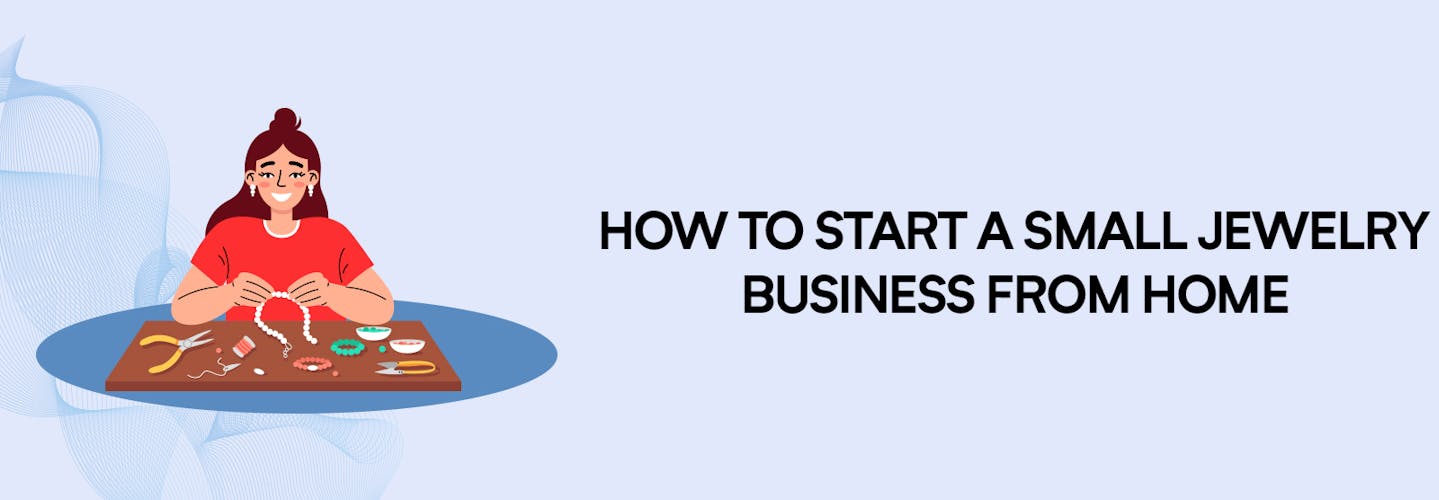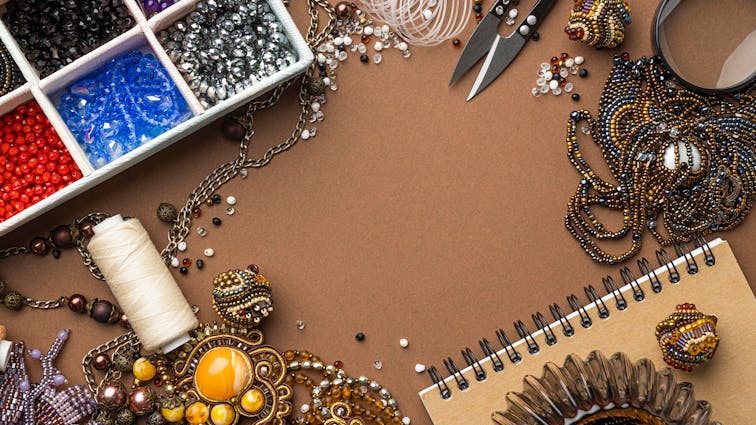
How to Start a Small Jewelry Business from Home: A Comprehensive Guide
Did you know Apple started in a garage? So why can’t your dream jewelry business kick off in your living room?
Hey, you! Yes, you, the aspiring jewelry mogul. Ever wondered how to turn your passion for jewelry into a thriving business right from the comfort of your home? Well, you’re in luck!
Starting a business can be daunting, especially when you’re navigating the sparkling world of gems and metals. Questions like “Where do I source materials?” or “How do I even start?” might be swirling in your head.
In this article, you’ll learn how to start a small jewelry business from home and how to scale it to new heights.
We’re talking business plans, sourcing materials, online marketing, and even collaborations that can skyrocket your brand.
Get ready for a step-by-step guide that will take you from a jewelry enthusiast to a business owner. We’ll tackle everything from market research to setting up your online store.
Why is this important? Because your dream shouldn’t just stay a dream. It’s time to turn it into a reality, and we’re here to guide you every step of the way.
Let’s get started, shall we?
Why start a jewelry business?
Starting a jewelry business can be a rewarding venture for several reasons:
- Creativity and Passion: If you have a passion for fashion or a creative flair, starting a jewelry business can be a fulfilling career. It’s a great way to share your work with the world, especially as jewelry can become especially sentimental to customers.
- Market Demand: Jewelry is one of the most popular things to make and sell online. The constant demand and the ever-increasing market value make starting a jewelry business a potentially lucrative idea.
- Flexibility: A jewelry business is one of the most flexible types of businesses a person can start. You don’t necessarily need to be a skilled craftsman or artist to start an e-commerce jewelry business.
As for the statistics, the global jewelry industry is thriving:
- The global jewelry market is expected to grow annually by 3.68% from 2023 to 2026.
- The global jewelry industry was valued at $298.40 billion in 2023.
- The U.S. jewelry market earned $60.42 billion in annual revenue in 2023.
- The market size is projected to grow at a CAGR of 4.6% from 2023 to 2030, reaching a revenue of USD 482.22 billion by 2030.
- In 2023, Asia’s market revenue was the highest at US$180.70bn, followed by North America’s market revenue at US$64.92bn and Europe’s market revenue at US$32.77bn.
These statistics indicate that the jewelry industry has significant potential for growth and profitability, making it an attractive business venture.
Starting A Small Jewelry Business From Home Can Involve Following Steps Below:

1. Choose a Niche and Target Market
Why is this important?
Choosing a niche is like finding your North Star in the jewelry business. It’s the compass that guides all your future decisions and helps you stand out in a crowded market.
Think about it: Would you rather be a small fish in a big pond or a big fish in a small pond? Specializing in a particular type of jewelry allows you to become the latter.
Whether you’re into handcrafted bohemian jewelry or fine, gemstone-studded pieces, your choice will dictate your target market.
Stats to Consider:
- Jewelry Market Size to Garner USD 266.53 Billion by 2027 | Growing at a Healthy CAGR of 3.7%
- The global handmade jewelry market was valued at around $29 billion in 2020 and is expected to reach $40 billion by 2025, with a CAGR of approximately 6%.
Action Steps:
1. List Down Your Interests and Skills
Start by jotting down what you’re passionate about and what you’re good at. Are you a whiz at intricate beadwork, or do you have a knack for sourcing unique gemstones? Your skills and interests will play a significant role in the type of jewelry you plan to sell.
2. Identify Gaps in the Market
Next, do some market research. Look for gaps where demand exceeds supply. Maybe there’s a shortage of sustainably-made jewelry, or perhaps there’s a burgeoning market for men’s jewelry that hasn’t been fully tapped into yet.
3. Decide on a Niche that Aligns with Both
Finally, combine your interests, skills, and market research to decide on a niche. This is where your jewelry business from home will focus. Make sure it’s a niche you can see yourself working in for the long haul.
Pro Tip:
Don’t just follow trends; think long-term. What’s trendy today might not be tomorrow. Your passion for your niche will sustain you through the ups and downs. Remember, starting a successful jewelry business isn’t a sprint; it’s a marathon.
Example: Let’s say you have a passion for vintage jewelry and you notice that there’s a gap in the market for high-quality, vintage-inspired lockets. You could start a small jewelry business specializing in just that. Your target market could be people who appreciate vintage aesthetics and are looking for meaningful gifts.
Some popular jewelry niches include:
- Fine jewelry
- Costume jewelry
- Handmade jewelry
- Personalized jewelry
- Men’s jewelry
- Children’s jewelry
- Bridal jewelry
- Ethnic jewelry
Once you have chosen a niche, you need to identify your target market. Who are you selling your jewelry to?
Are you targeting millennials, working moms, or brides-to-be?
Once you know your target market, you can start to develop products and marketing materials that appeal to them.
2. Research the Market and Trends
Why is this important?
Knowledge is power, especially in the jewelry business. The more you know about the market and current trends, the better equipped you’ll be to make informed decisions.
Ignorance isn’t bliss when you’re trying to start a successful jewelry business. Understanding market dynamics and trends can be the difference between a thriving business and a failed venture.
Stats to Consider:
- 70% of consumers expect brands to take a stand on social and political issues, including sustainability.
Action Steps:
1. Conduct a SWOT Analysis
SWOT stands for Strengths, Weaknesses, Opportunities, and Threats. This analysis will give you a 360-degree view of your jewelry business online. It helps you understand what you’re good at, where you can improve, what opportunities you should seize, and what threats you should be aware of.
2. Keep an Eye on Industry Reports and Fashion Magazines
Industry reports can provide valuable insights into market trends and consumer behaviors. Fashion magazines, on the other hand, can give you a glimpse into what’s hot and what’s not in the jewelry market.
3. Follow Influencers and Thought Leaders
Influencers can significantly impact trends. By following them, you can get a sense of what’s gaining traction in the jewelry industry. This can be particularly useful for starting an online jewelry business where trends can shift rapidly.
Thought-Provoking Question:
Are you aware of the ethical considerations in the jewelry industry? Sustainable and ethical jewelry is a growing trend. Could this be your unique selling point?
3. Conduct Customer Research

Why is this important?
Understanding your customer is like having a GPS for your jewelry business. It tells you exactly where to go and what turns to make. If you don’t know who you’re selling to, how can you sell your jewelry effectively?
Fun Fact: 91% of consumers say they are more likely to shop with brands that provide offers and recommendations that are relevant to them. - Accenture
Action Steps:
1. Create Customer Personas
Develop detailed customer personas to understand who you’re targeting. Are they millennials interested in sustainable products, or are they older individuals looking for timeless pieces?
2. Conduct Surveys and Focus Groups
Use surveys and focus groups to dive deeper into customer preferences. Ask questions that will help you understand what types of jewelry pieces they’re interested in and what price points are acceptable.
3. Use Social Media Analytics
Platforms like Instagram and Facebook offer valuable analytics that can help you gauge customer interests and behaviors. This is particularly useful for starting your own jewelry business online where social media plays a pivotal role.
4.Develop a Business Plan
Why is this important?
A business plan isn’t just a piece of paper; it’s your roadmap to starting a successful jewelry business. Think of it as the architectural blueprint for your dream home.
It outlines your mission, vision, and the nitty-gritty details of how you’ll run your jewelry business from home or online. Without it, you’re essentially navigating through the dark.
Stats to Consider:
- Only 35% of business owners who were surveyed had finished a business plan.
- 30% More Chances Of Your Business Growth With A Business Plan
Action Steps:
1. Outline Your Business Objectives
What do you hope to achieve with your jewelry business? Whether it’s reaching a certain revenue milestone or establishing a strong brand presence, outline these objectives clearly.
2. Detail Your Marketing, Operational, and Financial Plans
Break down how you plan to market your jewelry online, the operational aspects like sourcing and production, and your financial projections. The more detailed, the better.
3. Set Achievable Milestones
Break your objectives into smaller, achievable milestones. This makes your goals more manageable and provides a clear path for achieving them.
Pro Tip:
Don’t underestimate the power of a well-crafted business plan. It’s not just for you; it’s also for potential investors. A solid plan can be your ticket to securing investment for your jewelry business.
Your business plan should include the following sections:
- Executive summary
- Company description
- Products and services
- Market analysis
- Competitive analysis
- Marketing plan
- Financial projections
5. Source Raw Materials

Why is this important?
The quality of your raw materials is the backbone of your jewelry business. It’s like cooking; you can’t make a gourmet meal with subpar ingredients. The quality of your raw materials will directly impact the quality of your final product.
Thought-Provoking Question: Have you considered the carbon footprint of your raw materials? Sustainability is not just a trend; it’s a responsibility.
Action Steps:
1. Research Suppliers and Their Credibility
Don’t just go for the first supplier you find. Research multiple suppliers, read reviews, and perhaps even visit their operations if possible. Make sure they align with your business values and quality standards.
2. Consider the Sustainability of the Materials
With the growing trend of sustainable and ethical jewelry, considering the sustainability of your materials could be a unique selling point. It’s not just good for the planet; it’s good for business.
3. Negotiate Terms and Conditions
Once you’ve identified a reliable supplier, negotiate the terms and conditions. This includes payment terms, delivery schedules, and quality checks.
6. Start Manufacturing Items from Your Home Workshop
Why is this important?
This is where the rubber meets the road, or in your case, where metal meets gemstone. Your home workshop is your sanctuary, the place where your creative visions transform into tangible pieces of art. It’s the heart of your small jewelry business.
Fun Fact: The most successful businesses started small. Apple began in a garage, so why can’t your jewelry empire start in your living room?
Action Steps:
1. Set Up a Dedicated Workspace
Create a space that’s solely dedicated to your jewelry making business. This will help you focus and keep all your tools and materials organized. Think of it as your creative haven.
2. Invest in High-Quality Tools
Quality tools are not a place to cut corners. Investing in high-quality tools will not only make your work easier but also ensure that your final products meet high standards.
3. Start with a Few Designs and Iterate Based on Feedback
Don’t try to launch with a full catalog. Start with a few designs and gather feedback from friends, family, or early customers. Use this feedback to iterate and improve.
Once you have your raw materials, you can start manufacturing jewelry in your home workshop.
The specific equipment and tools you need will depend on the type of jewelry you are making. However, some basic tools and equipment include:
- Jewelry pliers
- Wire cutters
- Beading tools
- Sawing tools
- Polishing tools
7. Build an Online Website and Showcase Your Items

Why is this important?
In today’s digital age, an online presence is as essential as the air we breathe. Your website is your virtual storefront, the face of your online jewelry business. It’s where potential customers will first encounter your brand and products.
Stats to Consider:
- Over the past year, there’s been a 93% increase in blogs using promotional techniques to drive traffic to their post including paid ads.
- And according to HubSpot, companies that produce a blog have 434% more search engine-indexed pages than those that don’t and they get 55% more website visitors than company websites without blogs.
Action Steps:
1. Choose a User-Friendly eCommerce Platform
Platforms like Shopify, WooCommerce, or even specialized platforms like Aasaan can make setting up your online store a breeze. Choose one that aligns with your needs and skill level.
2. Optimize for SEO
From your website structure to product descriptions, every element should be optimized for search engines. This is crucial for starting a successful online jewelry business.
3. Use High-Quality Images and Compelling Product Descriptions
A picture is worth a thousand words, but a well-written product description can be worth a thousand sales. Use high-quality images and write compelling descriptions to entice your customers.
Pro Tip:
Your website is your brand’s first impression. Make it count. A well-designed, user-friendly website can turn visitors into customers and customers into brand advocates.
8. Develop a Product Line
Why is this important?
A cohesive product line is like a well-curated art gallery; each piece complements the others, creating a unified experience that’s greater than the sum of its parts. It gives your jewelry business a distinct identity and allure that can captivate your target market.
Thought-Provoking Question: What’s the story behind your product line? Every piece of jewelry should tell a story. Make sure yours does too.
Action Steps:
1. Choose a Theme or Concept
Whether it’s vintage elegance, modern minimalism, or bohemian chic, choose a theme or concept that will guide your jewelry designs. This theme should resonate with your target market and set you apart from competitors.
2. Design Pieces that Complement Each Other
Your pieces should not only be beautiful on their own but also work well together. Think of it as creating a family of products that share a common DNA.
3. Think About Packaging and Presentation
The unboxing experience can be just as important as the product itself. Invest in packaging that aligns with your brand’s aesthetic and enhances the customer experience.
As your business grows, you can start to develop a product line of jewelry. This will help you to appeal to a wider range of customers and increase your sales.
When developing a product line, it is important to consider the following factors:
- Your target market
- Your budget
- Your time constraints
- Your skills and expertise
9. Register Your Business Name

Why is this important?
Registering your business name isn’t just a formality; it’s a statement of intent. It gives you legal ownership of the name and adds a layer of credibility to your jewelry business. It’s like planting a flag on a piece of land and saying, “This is mine.”
Stats to Consider:
- It takes 5-7 impressions to start building brand awareness. This means you need to build a recognizable brand, or it could take even longer.
- 63% of consumers stop purchasing products and services from companies who provide poorly executed personalization
Action Steps:
1. Check for Name Availability
Before you get too attached to a name, make sure it’s available. The last thing you want is to face legal issues down the line.
2. Register with the Appropriate Governmental Bodies
Once you’ve chosen an available name, register it with the relevant governmental bodies to make it officially yours.
3. Consider Trademarking Your Business Name
If you have big plans for your jewelry business, consider trademarking the name. This will give you exclusive rights to use it and protect it from being used by others.
Pro Tip:
Choose a name that reflects your brand’s essence but is also easy to remember. A memorable name can be a powerful asset in the jewelry market.
You can sell jewelry online from your own store, on third-party marketplaces, on niche websites, on social media, and via wholesale. You can also expand your business by:
Expand Your Sales Channels and Business Opportunities
Diversification is the spice of life, and in the jewelry business, it’s the key to long-term success.
Relying on a single sales channel is like putting all your eggs in one basket. By expanding your sales avenues and business opportunities.
You’re not just increasing your revenue streams; you’re fortifying your business against market volatility.
Stats to Consider:
- Businesses that adopt omnichannel strategies achieve 91% greater year-over-year customer retention rates.
- Influencer Marketing Industry is set to grow to approximately $21.1 Billion in 2023.
Action Steps:
1. Sell on Multiple Platforms
Don’t limit yourself to just your online store. Utilize third-party marketplaces like Etsy, niche websites, and social media platforms to reach a broader audience.
2. Collaborate with Influencers on Social Media
Influencers can give your jewelry brand a significant boost. Choose influencers whose followers align with your target market for maximum impact.
3. Offer Customized Jewelry
Personalization is a big selling point. Offering customized jewelry can set you apart from competitors and add a unique touch to your product line.
4. Cultivate Relationships in Your Network
Networking isn’t just for corporate folks; it’s crucial in the jewelry industry too. Build relationships with other business owners, suppliers, and even customers. You never know where your next big opportunity will come from.
5. Partner with Like-Minded Businesses or Artists
Collaborations can be a win-win situation. Whether it’s a joint product line or a co-hosted event, partnerships can help you tap into new customer bases.
6. Offer Jewelry Repair Services
This not only adds another revenue stream but also keeps customers coming back. It’s a great way to build customer loyalty and get repeat business.
Pro Tip:
Don’t spread yourself too thin. While it’s good to diversify, ensure you can manage all these different channels and opportunities without compromising on quality or customer service.
Here are some additional tips for starting a successful small jewelry business from home:
- Focus on quality. Make sure that your jewelry is well-made and high-quality. Customers are more likely to come back for more if they are happy with their purchase.
- Take professional photos. Your jewelry will look more appealing to potential customers if you use professional photos. You can hire a professional photographer or take your own photos using a good camera and lighting.
- Offer excellent customer service. Be responsive to customer inquiries and go the extra mile to make your customers happy.
- Market your business. Promote your jewelry business through social media, search engine optimization (SEO), and email marketing. You can also attend trade shows and craft fairs to reach new customers.
Conclusion:
Starting a jewelry business requires not just artistic ability, but also a mind for business, organizational skills, and marketing savvy.
From product creation, packaging, and pricing to formation and branding, every step is crucial in making your dream venture a success.
Furthermore, offering an expansive product line, exploring multiple sales channels, and continuously widening your business horizon are vital for long-term growth.
As challenging as this journey may be, it’s also fulfilling. With the right strategies in place, hard work, and resilience, anyone can establish a profitable jewelry business and transform their passion into a profitable endeavour.
Emphasizing quality products, fantastic customer service, and effective marketing strategies will set you up for success in the competitive world of jewelry. Good luck!
FAQ’S About Online jewelry business:
1: What is an online jewelry business?
A: An online jewelry business is a type of small business where you sell jewelry products online through your own website or online marketplace platforms.
2: How can I start a jewelry business online?
A: To start a jewelry business online, you need to follow a step-by-step guide that includes tasks like market research, creating a business plan, setting up an online store, sourcing or making jewelry products, and marketing your business.
3: Do I need to have a background in jewelry design to start an online jewelry business?
A: No, you don’t necessarily need a background in jewelry design to start an online jewelry business. You can source jewelry products from manufacturers or wholesalers.
4: What type of jewelry can I sell in my online store?
A: You can choose to sell various types of jewelry in your online store, such as fashion jewelry, fine jewelry, handmade jewelry, customized jewelry, or bridal jewelry. It depends on your target market and personal preferences.
5: Do I need a business license to start a jewelry business online?
A: Yes, you generally need a business license to legally operate a jewelry business online. The specific requirements may vary depending on your location, so it’s important to check with your local government or small business administration.
6: How can I price my jewelry products?
A: Pricing your jewelry products is a crucial aspect of running an online jewelry business. You need to consider factors like material costs, labor costs, competitor prices, market demand, and desired profit margin to determine the appropriate pricing strategy.
7: Where can I find jewelry manufacturers to source my products?
A: You can find jewelry manufacturers by attending trade shows, searching online directories, contacting jewelry associations, or using sourcing platforms specifically designed for connecting jewelry businesses with manufacturers.
8: How can I market my online jewelry business?
A: There are various marketing strategies you can use to promote your online jewelry business, such as social media marketing, influencer collaborations, email marketing, content marketing, search engine optimization (SEO), and online advertising.
9: How can I grow my online jewelry business?
A: To grow your online jewelry business, you can focus on building a strong online presence, expanding your product offerings, improving customer service, implementing effective marketing campaigns, optimizing your website for conversions, and building relationships with customers and influencers.
10: What are some common expenses to consider when starting an online jewelry business?
A: Some common expenses to consider when starting an online jewelry business include website development and maintenance costs, inventory purchase or production costs, packaging and shipping expenses, marketing expenses, and administrative costs like business licenses and software tools.








